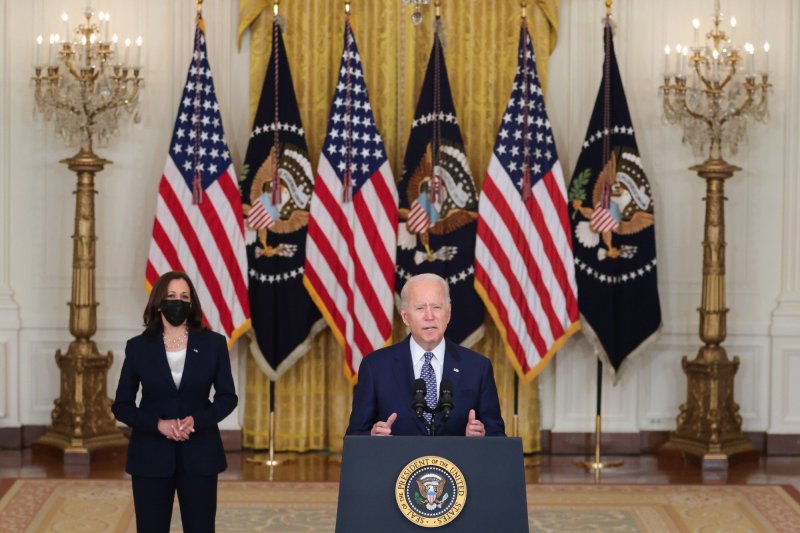1 of 12 | President Joe Biden (R) and Vice President Kamala Harris deliver remarks on the passage of the Senate's bipartisan Infrastructure Investment and Jobs Act in the East Room of the White House in Washington, D.C., on Tuesday. Photo by Oliver Contreras/UPI |
License Photo
Aug. 10 (UPI) -- The Senate on Tuesday voted to pass a $1.2 trillion bipartisan infrastructure package, a key part of President Joe Biden's agenda, and send it to the House, where it may encounter some resistance.
The upper chamber voted 69-30 to pass the measure, which was supported by all Democrats and 19 Republicans.
Immediately after the vote, Democrats needed Vice President Kamala Harris to cast a tie-breaking vote to next start debate on Democrats' $3.5 trillion spending plan, which includes funding for various social and healthcare measures and climate change.
The infrastructure bill now goes to the House, where Speaker Nancy Pelosi said she would not consider it until the Senate also passed the spending package. The House is not scheduled to return from August recess until Sept. 20.
Among the Republicans who voted for the bill were Sens. Roy Blunt of Missouri, Richard Burr of North Carolina, Shelley Moore Capito of West Virginia, Bill Cassidy of Louisiana, Susan Collins of Maine, Mitt Romney of Utah, Lisa Murkowski of Alaska, Jim Risch of Idaho, Mike Crapo of Idaho, Deb Fischer of Nebraska, Lindsey Graham of South Carolina, Chuck Grassley of Iowa, Rob Portman of Ohio, Kevin Cramer and John Hoeven of North Dakota, and Senate Republican leader Mitch McConnell of Kentucky.
Biden praised the bipartisan passage of the legislation during remarks at the White House.
"This bill shows that we can work together. I know a lot of people -- some sitting in the audience here -- didn't think this could happen," he said.
"That bipartisanship was a thing of the past. From the time I announced my candidacy ... it was characterized as a relic of an earlier age. As you may well remember, I never believe that. I still don't. So, I want to thank those senators who worked so hard to bring this agreement together. I know it wasn't easy."
The infrastructure package was put together last month following weeks of negotiations and multiple hurdles and represents the first major legislative effort to receive significant support from both sides of the aisle since Biden took office in January.
If passed, it would usher in the most sweeping improvements to U.S. bridges, roads and rails in decades. Making such critical repairs has been a legislative priority in Washington, D.C., for years.
"We have come to an agreement after all the long hard negotiating, the stops and starts, we're here," Schumer said, according to CNN.
"And it's a good thing, a very good thing for America."
Among other things, the legislation would reauthorize spending to avoid tax hikes and increasing the deficit while offering billions in new spending to neglected areas like electrical grids and other projects.
Some Republican lawmakers have opposed the bipartisan effort, saying the bill would open the door to progressive initiatives and massive debt.
Many Republicans still oppose the proposal, but not enough to keep it from passing Tuesday with a unified Democratic bloc and nearly two dozen Republican senators.
The Congressional Budget Office has estimated that the infrastructure package would add $256 billion to the deficit.
Transportation Secretary Pete Buttigieg said last weekend that it includes methods that will pay for itself, and that it's preferable than the "cost of doing nothing."
While the bill faces some opposition in the House, it would be expected to pass the Democratic-held chamber and move to Biden's desk for his signature.















